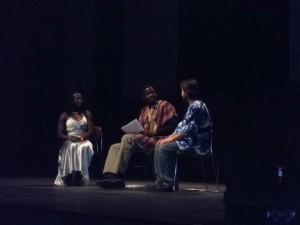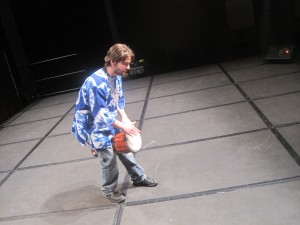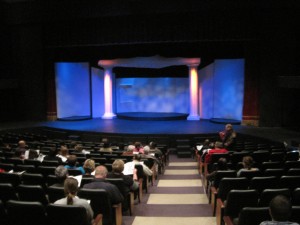Away from the news of uprisings and unrests in parts of the continent, students and faculty of my university gathered on campus on Saturday to feast and celebrate what unites us all: the beauty of music, the graciousness of fashion, the excitement of dance, and the great pleasure of diversity. It was the annual Africa Night event which took place at the Meridian Ballroom. I was the host, along with Jacob Moorleghen, a volunteer from the S.P.E.A.C club – a charming co-host.
 Written as a play of two friends from two countries travelling round the continent discovering places, people, food, artifacts and events, the show centred around showing the audience what they would usually not see on the news about Africa and its various people. A continent of (now) fifty-five countries is something that no one would be confident enough to claim to know without some sort of guidance, and the patience to explore. Jake was the American filmmaker, and I was his resource. A little tension of the “otherness” is added, and the drama of discovery begins. We went from Kenya to South Africa, to Congo and to Ghana, and to Nigeria, touching on sites of historical and economic significance along the way in other parts of the continent. The script was written by Julaine Fowlin and supported by a wonderful cast of students and other volunteers.
Written as a play of two friends from two countries travelling round the continent discovering places, people, food, artifacts and events, the show centred around showing the audience what they would usually not see on the news about Africa and its various people. A continent of (now) fifty-five countries is something that no one would be confident enough to claim to know without some sort of guidance, and the patience to explore. Jake was the American filmmaker, and I was his resource. A little tension of the “otherness” is added, and the drama of discovery begins. We went from Kenya to South Africa, to Congo and to Ghana, and to Nigeria, touching on sites of historical and economic significance along the way in other parts of the continent. The script was written by Julaine Fowlin and supported by a wonderful cast of students and other volunteers.
I am passionate about things like this – theatre, and such opportunities for social interaction and intervention, and I am very happy that it went very well. More than just the pleasure of bringing the beautiful aspects of the continent’s cultures to the appreciation of the most diverse audience, there is also a joy of being in company of such young people who hold the key to the next generation. It was a great night, and I thank the students for inviting/involving me.


